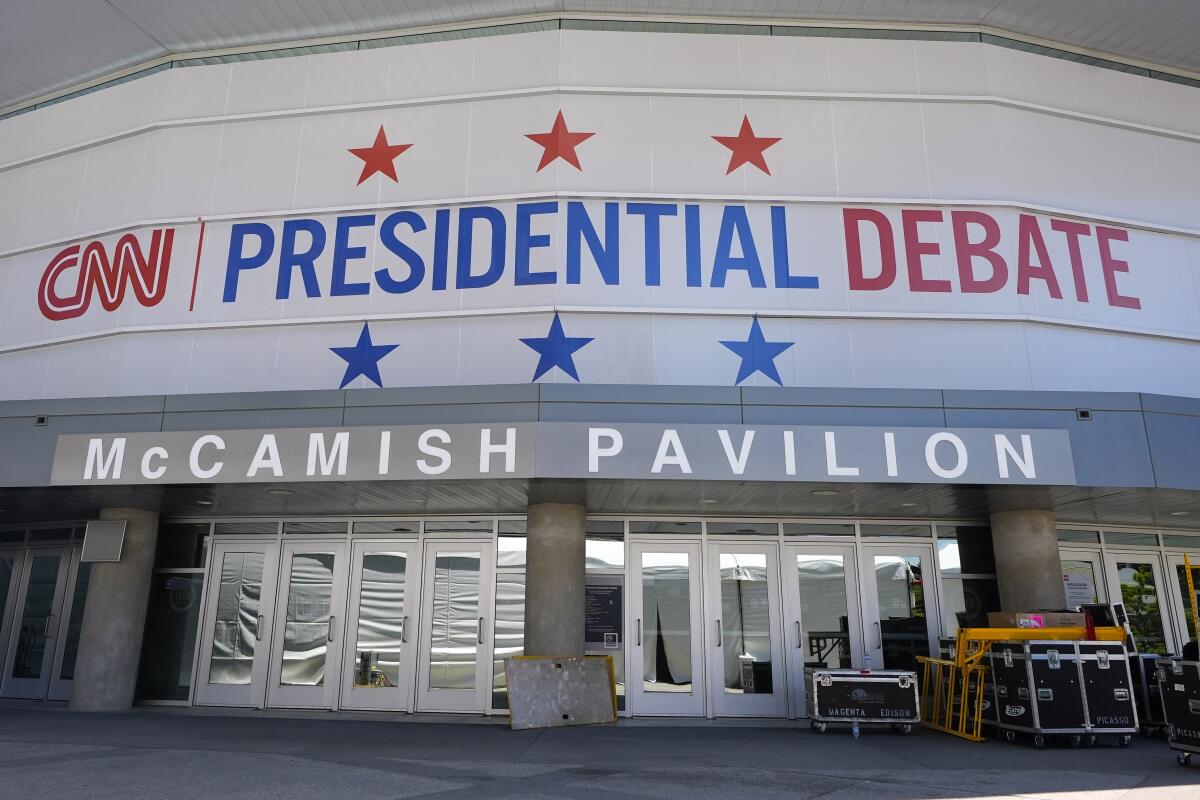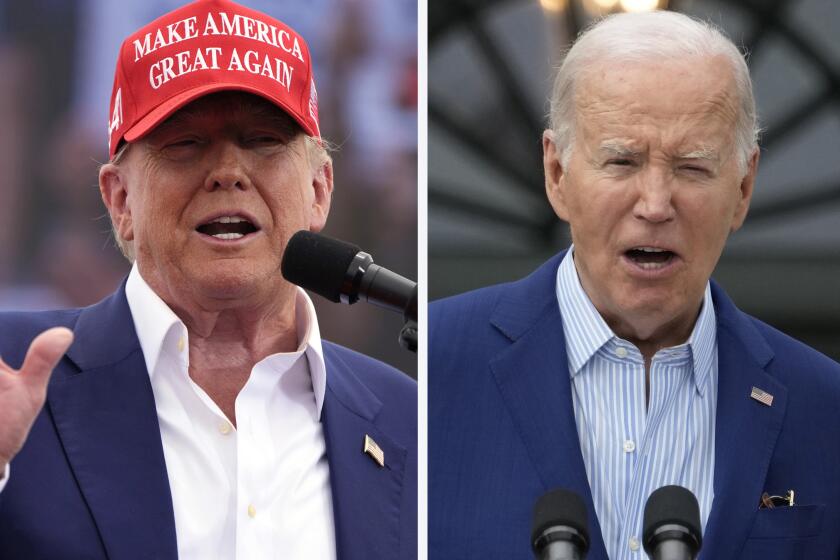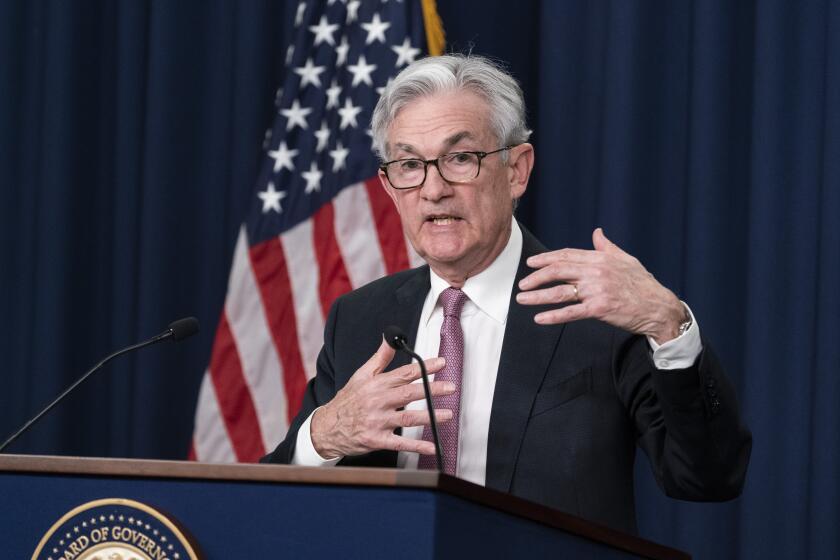Column: If Trump claims he’s master of the economic universe in the debate, he’ll be lying

If Donald Trump is reelected in November, despite baggage that would deep-six any other politician, he can chalk it up mainly to one thing: Voters’ perception that he can handle their top concern — the economy — better than President Biden. Emphasis on “perception.”
Trump would have Americans believe that as president, he created “the greatest economy in the history of the world” (fact-check: false), and some voters buy that. He says he’ll repeat the feat if he’s returned to power. The truth is, Trump inherited a growing economy from President Obama — much as he inherited his business from his dad — and he left a pandemic-sickened one to Biden. Also, growth on his watch didn’t come close to the average under Obama, or any of the previous seven U.S. presidents. Under Biden, the economy grew last year more than in any year of Trump’s term.
Opinion Columnist
Jackie Calmes
Jackie Calmes brings a critical eye to the national political scene. She has decades of experience covering the White House and Congress.
Consider this something of a pre-buttal of Trump’s false, hyperbolic or questionable claims to be master of the economic universe, because he’s sure to regurgitate them during his debate with Biden on CNN on Thursday night.
The argument isn’t just mine. Experts lately have come forward to suggest that a reelected Biden would be preferable to Trump 2.0 when it comes to the economy and the federal budget.
The nonpartisan Committee for a Responsible Federal Budget is out with a comparative look at the fiscal record. Its analysis released Monday showed that Trump, as president, added $8.4 trillion to the national debt, nearly twice the $4.3-trillion increase under Biden, with seven months remaining in his term.
It’s our civic duty to pay attention when presidential candidates go head to head, but who could blame Americans for not watching the Biden-Trump debate in Atlanta?
The big-ticket items within those sums reflect the two presidents’ contrasting priorities. Not quite one-fourth of Trump’s debt is a product of his tax cuts, which mostly benefited corporations and wealthy Americans. Much of Biden’s big spending went to college-student loan relief, veterans’ healthcare, food stamps and Medicaid.
Neither man focused much on the opposite economic imperative: holding down the nation’s climbing annual budget deficits. But Trump’s $443 billion in deficit reduction is less than one-fourth of Biden’s $1.9 trillion to date.
The bottom line: Biden beats Trump, with less debt and more deficit reduction.
The economy has shown some signs of cooling, though job growth remains strong and average wage gains are running slightly above the rate of inflation.
As for how the overall economy would fare depending on who’s president after 2024, Moody’s last week came out with a macroeconomic analysis of the candidates’ agendas. Spoiler alert: “Bottom line, in their totality, Biden’s policies are better for the economy than Trump’s,” Moody’s chief economist Mark M. Zandi told me. “They lead to more growth and less inflation.”
Trump would actually spawn a recession before 2025 ended, thanks largely to his twin obsessions: tariffs and immigrants. Trump’s plans for mass deportations of immigrants without legal status would deplete the labor force. And his proposed 10% tariff on all imports (60% or more on Chinese goods) would raise prices for consumers and manufacturers, reduce exports as other nations retaliate with their own tariffs, and cost American jobs — just as his more limited first-term tariffs did.
Moody’s projects that after Trump’s recession, the economy would return to growth late in his second term, for average annual growth over four years of 1.3%. The growth forecast with four more years of Bidenomics? An average 2.1% a year. Do the math.
House Speaker Mike Johnson’s ‘quiet’ actions in Congress announce how far from the country’s interests Republicans are willing to stray.
Moody’s isn’t alone in its conclusion favoring Biden over Trumponomics. This week Axios reported that 16 Nobel Prize-winning economists of varying views signed a letter concluding: “We all agree that Joe Biden’s economic agenda is vastly superior.”
Trump likes to say that he’d move to impose tariffs and carry out deportations on “Day One.” Indeed, he can do much unilaterally. But his third pet policy — tax cuts — would need Congress’ sign-off. With Trump’s first-term income tax cuts for mostly high-income Americans set to expire next year, he wants to extend them, at a cost of about $5 trillion over a decade. And he wants to further cut corporations’ income tax rate.
Biden instead proposes to extend the tax rates for Americans making less than $400,000 a year, and to raise the 21% corporate rate to 28%, halfway back to its former 35%. And he wants a minimum 25% wealth tax on those with a net worth of $100 million or more.
You might think the contrast between the rivals’ tax plans would have corporate chiefs flocking to Trump’s side. That’s what some recent media coverage suggested by its hyping of a few billionaires’ endorsements and donations: “A flood of elite GOP donors” has been coming “off the sidelines,” Axios wrote. Not quite.
Everyone’s wondering whom Trump will choose as his vice presidential running mate. They should be asking why anyone would want the job.
On the heels of reports that Trump had bombed in a private meeting this month with executives of the Business Roundtable (“remarkably meandering, could not keep a straight thought”) came Monday’s damning op-ed in the New York Times from “CEO whisperer” Jeffrey A. Sonnenfeld, president of Yale’s Chief Executive Leadership Institute. Sonnenfeld wrote that not a single Fortune 100 CEO is supporting Trump, in a historic break for the mostly Republican crowd.
“The Trump economic package frightens them. It’s extremely inflationary,” Sonnenfeld said on CNBC, and the proposed tariffs in particular are “just crazy.” As for Biden, Sonnenfeld wrote in his op-ed that the CEOs’ dislike of the president’s attacks on corporate “greed” and aggressive antitrust enforcement is offset by their appreciation of his infrastructure and chip-manufacturing investments, avoidance of a post-pandemic recession and record energy production and corporate profits — Trump’s lies about all of it notwithstanding.
Sonnenfeld’s prediction: “They’ll be reluctant Biden voters.”
The plutocrats’ votes aren’t enough. Biden needs to cut into the majorities of voters who tell pollsters that their top issues are the economy and inflation, and that Trump would do a better job on both. Biden — and the facts — must turn more of them into his voters, if only reluctant ones.
More to Read
Get the latest from Jackie Calmes
Commentary on politics and more from award-winning opinion columnist.
You may occasionally receive promotional content from the Los Angeles Times.
















